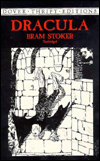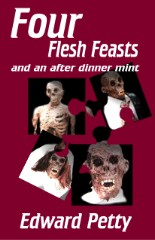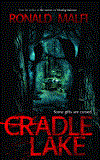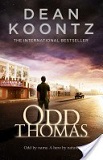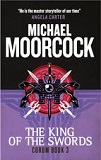Falling Angel, by William Hjortsberg
Book Review by James Michael White
Have you read this book?
I'm a great big fan of Raymond Chandler's detective novels, and of horror stories, too. Apparently, so was author William Hjortsberg, who in the winter of 1978 sat down in Haiti on a pile of NEA grant money to finish his novel, Falling Angel, an homage to Chandler, Dashiel Hammett, and Ross Macdonald, incorporating into that kind of hard-boiled world of low-lifes, petty crooks, cranks, and charlatans, an equally well-boiled view of the world and how things are. Except for one thing. His hard-boiled detective, a veteran of WWII, was about to run into things the aforementioned trio of writers never, ever, threw at their characters. What Hjortsberg came up with, perpetually in print since its Halloween '78 debut, goes something like this:
Friday the thirteenth, 1959, and detective Harry Angel is hired by well-heeled gentleman, Louis Cyphre, to find a once popular singer, now long since faded from stage, public view, and seemingly the world itself. Singer's name is Johnny Favorite, a million-record-selling crooner who was the Sinatra of his day. It seems that Mr. Favorite skipped out on Mr. Cyphre and a deal that they had, owing to him certain unspecified collateral.
Angel takes the case. It leads him through New York's seediest underground, strange outcasts, voodoo cults, and even all the way to the heights of the Chrysler building and the office of a weight-lifting shipping tycoon. What he pieces together along the way is an increasingly terrifying picture of the elusive guy he's supposed to find, one whom, it seems, will stop at nothing to prevent discovery.
The de rigueur damsel in distress appears in the persona of Epiphany Proudfoot, a young woman whose mother was connected to Johnny Favorite back in the old days, and she proves one of the few people who will talk to Angel about him. Unfortunately, she knows little about the guy. Fortunately, she knows a lot about occult matters, and it's into the occult that the case increasingly begins to fall as Angel, trying to pin down the ever-elusive Favorite, finds himself hoodwinked, snookered, and beaten-up along the way until, at last, he pins the tail on the invisible donkey while murder victims stack up all around him, the local police breathing down his neck.
That the ending is violent and shocking and every inch appropriate for the subject matter is less important than how the horror of this detective novel is achieved. At least one critic has pointed out that true horror is really about the shock of self recognition: we see in characters the most disturbing aspects of ourselves, and the stories that most clearly evoke such identification within readers are those that horrify by showing the dark parts of our own humanity, parts that we'd rather not think about. To feel uncomfortable about other characters and what they're doing means that we can simply turn away, say, Well, that's not me. But to recognize deviltry in our own souls, ah, now that's horror.
Hjortsberg's Falling Angel achieves this and more, evoking a decaying New York during the decline of both a decade and, arguably, national character, with all the economical clarity of one who lived there, managing to make it seem real, grubby, and lived-in. The prose is simple, direct, and clear, short chapters zipping along with an unencumbered quickness that makes setup and climax hit as hard and quick as a boxer's jab-cross-hook combination to the literary jaw.
Some readers, probably those who haven't seen Alan Parker's 1987 movie version of this story, "Angel Heart," will eat this thing alive. Others may be put off by the prose that makes this story so quickly gallop along. Economical it is, but in a way that may make other readers want a little more meat on these literary bones. Those things aside, that NEA money allowed Hjortsberg the six months he needed to generate some memorable hard-boiled patter and a literary landmark with one foot in the hard-boiled detective tradition, the other squarely in horror.
Friday the thirteenth, 1959, and detective Harry Angel is hired by well-heeled gentleman, Louis Cyphre, to find a once popular singer, now long since faded from stage, public view, and seemingly the world itself. Singer's name is Johnny Favorite, a million-record-selling crooner who was the Sinatra of his day. It seems that Mr. Favorite skipped out on Mr. Cyphre and a deal that they had, owing to him certain unspecified collateral.
Angel takes the case. It leads him through New York's seediest underground, strange outcasts, voodoo cults, and even all the way to the heights of the Chrysler building and the office of a weight-lifting shipping tycoon. What he pieces together along the way is an increasingly terrifying picture of the elusive guy he's supposed to find, one whom, it seems, will stop at nothing to prevent discovery.
The de rigueur damsel in distress appears in the persona of Epiphany Proudfoot, a young woman whose mother was connected to Johnny Favorite back in the old days, and she proves one of the few people who will talk to Angel about him. Unfortunately, she knows little about the guy. Fortunately, she knows a lot about occult matters, and it's into the occult that the case increasingly begins to fall as Angel, trying to pin down the ever-elusive Favorite, finds himself hoodwinked, snookered, and beaten-up along the way until, at last, he pins the tail on the invisible donkey while murder victims stack up all around him, the local police breathing down his neck.
That the ending is violent and shocking and every inch appropriate for the subject matter is less important than how the horror of this detective novel is achieved. At least one critic has pointed out that true horror is really about the shock of self recognition: we see in characters the most disturbing aspects of ourselves, and the stories that most clearly evoke such identification within readers are those that horrify by showing the dark parts of our own humanity, parts that we'd rather not think about. To feel uncomfortable about other characters and what they're doing means that we can simply turn away, say, Well, that's not me. But to recognize deviltry in our own souls, ah, now that's horror.
Hjortsberg's Falling Angel achieves this and more, evoking a decaying New York during the decline of both a decade and, arguably, national character, with all the economical clarity of one who lived there, managing to make it seem real, grubby, and lived-in. The prose is simple, direct, and clear, short chapters zipping along with an unencumbered quickness that makes setup and climax hit as hard and quick as a boxer's jab-cross-hook combination to the literary jaw.
Some readers, probably those who haven't seen Alan Parker's 1987 movie version of this story, "Angel Heart," will eat this thing alive. Others may be put off by the prose that makes this story so quickly gallop along. Economical it is, but in a way that may make other readers want a little more meat on these literary bones. Those things aside, that NEA money allowed Hjortsberg the six months he needed to generate some memorable hard-boiled patter and a literary landmark with one foot in the hard-boiled detective tradition, the other squarely in horror.
|
Click here to buy Falling Angel, by William Hjortsberg on Amazon
|
Falling Angel, by William Hjortsberg on Amazon
| More Books You Might Like |
Comment on Falling Angel, by William Hjortsberg
